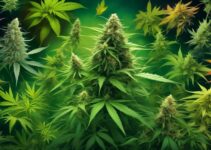So, you've decided to start your own tropical garden and are eager to get the best results possible. Choosing the right seeds is crucial to the success of your endeavor, but navigating the nuances of tropical climates can be a daunting task. With the vast array of options available, how do you ensure that you're making the best choices for your specific environment? Let's explore the key factors to consider when selecting seeds for tropical climates, and how this grower's guide can provide you with the knowledge and confidence to make informed decisions for your garden.
Key Takeaways
- Understanding the climate and unique challenges of tropical regions is crucial when choosing seeds for cultivation.
- Prioritize seeds with high heat and humidity tolerance, as well as resistance to common pests and diseases in tropical climates.
- Look for seeds with proven track records of thriving in tropical conditions, ensuring genetic stability and consistent performance.
- Consider reputable online seed banks or local dispensaries that offer strains specifically bred or recommended for tropical climates.
Understanding Tropical Climates
In tropical climates, you can expect consistently warm temperatures and high humidity throughout the year, creating an ideal environment for certain crops and requiring specific considerations for seed starting and pest management. Tropical regions maintain warm temperatures year-round and high humidity, making them suitable for crops that thrive in these conditions, such as corn, ginger, okra, and melons. When starting seeds in trays in tropical climates, timing is crucial. While it's possible to start seeds at any time, it's preferable to avoid the cool or peak summer seasons. Understanding the unique challenges of pest and disease control in tropical climates is essential. The high humidity and warmth create a favorable environment for various pests and diseases. Therefore, employing natural pest control methods and seeking specific regional advice is crucial for effective pest management in tropical climates. By understanding these aspects of tropical climates, you can make informed decisions when choosing seeds and implementing successful cultivation practices in these regions.
Characteristics of Tropical Adapted Seeds
Considering the warm temperatures and high humidity in tropical climates, it's essential to understand the characteristics of seeds that are well-suited for these conditions. When choosing seeds for tropical climates, look for the following characteristics:
- Tolerance to High Heat and Humidity: Tropical adapted seeds are more tolerant to the intense heat and humidity found in tropical regions. Look for seeds of crops like corn, ginger, okra, and melons, as these are well-suited for the tropical climate.
- Suitable for High Humidity: Choose seeds that are well-draining and suitable for the high humidity in tropical climates. This is important to prevent issues like root rot and fungal diseases, which are common in humid conditions.
- Year-Round Growth Potential: Some crops like bunching onions and many herbs can be grown year-round in tropical climates. Consider these options for consistent production throughout the year.
Best Weed Seed Strains for Tropical Climates
When selecting weed seed strains for tropical climates, prioritize those with high heat and humidity tolerance to ensure successful cultivation. Consider growing sativa or hybrid strains that can thrive in the warm summer and humidity of tropical climates. Look for strains with resistance to common pests and diseases in tropical regions to avoid potential issues during cultivation. It's essential to choose weed seed strains with a shorter flowering time to mitigate the risk of problems associated with high humidity. Opt for strains that have been specifically bred or adapted for tropical conditions, as these are more likely to succeed in such environments. Additionally, prioritize strains that have a proven track record of thriving in tropical climates to increase the likelihood of a successful harvest. By opting for weed seed strains that meet these criteria, you can set yourself up for a more successful cultivation experience in tropical climates.
Tips for Selecting Tropical Adapted Seed Strains
When selecting seed strains for tropical climates, consider the climate suitability and disease resistance of the varieties. Look for seeds that are specifically bred or adapted to thrive in high heat and humidity conditions. Understanding the unique challenges of tropical climates and choosing seeds with the right characteristics can greatly improve your gardening success.
Climate Suitability
To ensure successful cultivation in tropical climates, it is essential to carefully select seed strains that are specifically adapted to thrive in the high humidity and warm temperatures characteristic of these regions. When considering climate suitability for seed strains in tropical climates, it's important to:
- Look for seed varieties that are more tolerant to the heat and humidity prevalent in tropical climates.
- Ensure that the selected seed strains can thrive in consistently warm conditions.
- Choose seeds that can withstand the challenges posed by pests and diseases commonly found in tropical climates.
Disease Resistance
For successful cultivation in tropical climates, prioritize selecting seed strains with strong disease resistance, a critical factor in ensuring healthy plant growth and a productive harvest. When choosing seed strains, look for varieties known for their resistance to common tropical diseases. For instance, consider tomatoes resistant to blight and cucumbers resistant to downy mildew. Research and seek out seed strains specifically developed for tropical conditions, ensuring they have a proven track record of thriving in high humidity and warmth. Prioritizing disease resistance minimizes the risk of plant loss and ensures a productive harvest in tropical climates. Here's a helpful table to guide your seed selection:
| Disease Resistant Seed Strains | Common Diseases Resisted |
|---|---|
| Tomato 'Roma' | Blight |
| Cucumber 'Suyo Long' | Downy Mildew |
| Papaya 'Red Lady' | Papaya Ringspot Virus |
| Banana 'Dwarf Cavendish' | Panama Disease Fusarium Wilt |
| Spinach 'Melody' | Downy Mildew |
Selecting disease-resistant seed strains is a crucial step to grow a bunch in tropical climates.
Factors to Consider When Choosing Seeds
Consider the climate and soil conditions of your tropical region when choosing seeds, as these factors greatly impact a plant's ability to thrive. Look for seeds that are resistant to common diseases and pests found in tropical climates to ensure a successful harvest. By taking these factors into account, you can select seeds that are best suited for the unique challenges and opportunities of tropical growing conditions.
Climate and Soil
When selecting seeds for tropical and subtropical climates, it's crucial to assess the specific requirements of the climate and soil to ensure successful cultivation. Consider the following factors when choosing seeds for these climates:
- Climate Variations: Subtropical climates have milder winters and varying humidity, while tropical climates maintain consistent warmth and high humidity. This affects the choice of crops that can thrive in each climate.
- Planting Seasons: In subtropical climates, cool season crops should be planted during the cool season, while warm-season crops are ideal for tropical climates. Understanding the best timing for planting is essential for successful cultivation.
- Pest and Disease Control: Pest and disease control can be challenging in both climates. Utilizing natural methods like companion planting and beneficial insects can help manage these challenges effectively.
Disease Resistance
Selecting seeds for tropical climates requires careful consideration of disease resistance to ensure successful cultivation in these regions with higher incidences of plant diseases. When choosing seeds, prioritize varieties specifically bred for disease resistance to common tropical plant ailments like fungal diseases and viral infections. Additionally, take into account the climate-specific diseases prevalent in tropical regions and opt for seeds developed to resist those specific diseases. Look for valuable information on a variety's ability to withstand diseases listed on seed packets or in seed catalogs. Seek advice from local agricultural extension services or gardening experts for recommendations on disease-resistant seed varieties well-suited to your specific tropical climate. Here's a helpful table to guide you in selecting disease-resistant seeds:
| Disease-Resistant Seed Varieties | Recommended for |
|---|---|
| Variety A | Fungal diseases |
| Variety B | Viral infections |
| Variety C | Specific climate-related diseases |
| Variety D | Resistant traits listed on packets |
Importance of Genetic Stability in Tropical Seeds
Ensuring genetic stability in tropical seeds is paramount for their reliable performance and resilience in warm and humid climates. The importance of genetic stability in tropical seeds cannot be overstated, and here's why:
- Consistent Performance: Genetic stability enables tropical seeds to consistently exhibit desired traits, such as high yield, quality produce, and disease resistance, despite the challenging tropical conditions.
- Adaptation to Tropical Challenges: Seeds with stable genetics can better adapt to the unique challenges of tropical climates, such as high heat and humidity, ensuring their ability to thrive and produce optimal yields.
- Long-Term Sustainability: Genetic stability in tropical seeds supports the long-term sustainability of crops in tropical regions, as it ensures that the seeds retain their desirable traits over generations, contributing to the stability and productivity of agricultural systems.
Where to Buy Marijuana Seeds for Tropical Climates
Genetic stability in tropical seeds is crucial for their successful cultivation in warm and humid climates, and when seeking to buy marijuana seeds for tropical regions, it is important to consider reputable online seed banks with a proven track record of offering strains tailored for high humidity and warm temperatures. Make sure to look for seed banks that specifically breed or recommend strains suitable for tropical climates. These strains are more likely to thrive in the unique conditions of high humidity and warm temperatures. Additionally, consider reaching out to experienced tropical climate growers for recommendations on where to buy marijuana seeds best suited for such conditions. They may have valuable insights and suggestions based on their firsthand experience with different seed banks and strains. While online seed banks offer convenience and a wide selection, also explore local dispensaries or seed banks in tropical areas that cater to the specific needs of tropical climate growers. Furthermore, since tropical regions generally do not experience cold weather, ensure that the strains you choose are resilient to such conditions.
Frequently Asked Questions
How Do I Know What Seeds to Buy?
You'll know what seeds to buy by considering your climate, selecting heat-tolerant varieties like cherry tomatoes and okra, aligning with planting seasons, looking for pest resistance, and exploring unique options like mamaki and Hawaiian chili peppers. It's like finding the perfect fit for your garden.
How Do I Choose the Best Seeds?
When choosing seeds, consider factors like heat tolerance and humidity preference in tropical climates. Look for seed varieties such as corn, ginger, okra, and melons that can thrive in high heat and humidity.
What Is the Difference Between Tropical and Subtropical?
In tropical climates, it's like living in a steamy sauna year-round, with consistently warm temperatures and high humidity. Subtropical regions, however, have milder winters and can be humid or dry, with a cooler winter period.
What Vegetables Grow Well in the Tropics?
In the tropics, some vegetables like corn, ginger, and okra thrive in the heat and humidity. When choosing seeds, consider pest management and select varieties that can withstand these conditions for successful cultivation.





